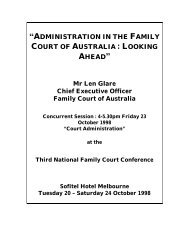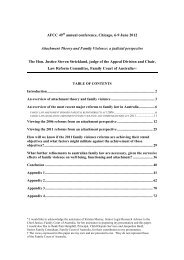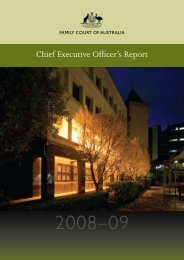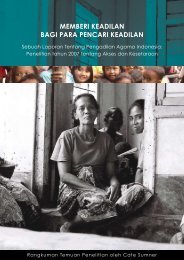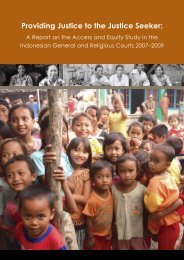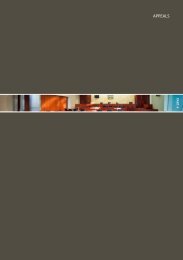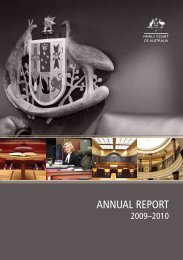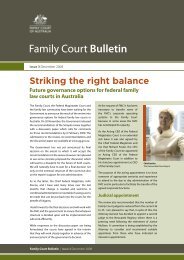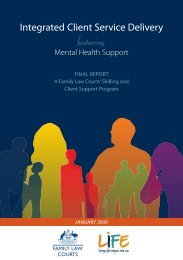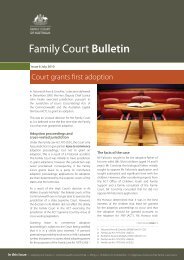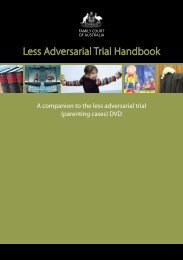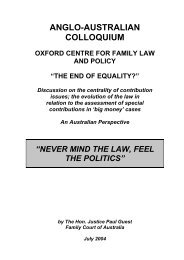Annual report [1997-98] - Family Court of Australia
Annual report [1997-98] - Family Court of Australia
Annual report [1997-98] - Family Court of Australia
You also want an ePaper? Increase the reach of your titles
YUMPU automatically turns print PDFs into web optimized ePapers that Google loves.
The <strong>Family</strong> <strong>Court</strong> <strong>of</strong> <strong>Australia</strong> – annual <strong>report</strong> <strong>1997</strong>-<strong>98</strong><br />
Evaluation <strong>of</strong> the integrated client services project<br />
Previous annual <strong>report</strong>s have described the characteristics <strong>of</strong> the Integrated Client Services<br />
(ICS) program and foreshadowed the evaluation <strong>of</strong> the pilot being carried out at the<br />
Parramatta registry. Consultants Kearney McKenzie and Associates were asked to evaluate<br />
the Parramatta ICS pilot and their <strong>report</strong> was delivered in March 19<strong>98</strong>. Briefly, the evaluation<br />
recommended that there be a cautious extension <strong>of</strong> ICS across registries and this<br />
would need to be accompanied by the necessary computer support.<br />
As I have previously explained, any decisions about the widespread adoption <strong>of</strong> ICS within<br />
the <strong>Court</strong> must also await the Attorney-General’s decision about the future <strong>of</strong> the <strong>Court</strong>’s<br />
primary dispute resolution services. However, as a normal part <strong>of</strong> improving its services,<br />
the <strong>Court</strong> is extending its computer network and building infrastructure which will have a<br />
capacity to support ICS when needed.<br />
Legal Aid matters<br />
Restrictions in the provision <strong>of</strong> legal aid to <strong>Family</strong> <strong>Court</strong> customers have unfortunately continued<br />
to be a feature <strong>of</strong> proceedings throughout the year. The impacts vary from State to<br />
State and are to some extent dependent upon the approach <strong>of</strong> the State Legal Aid<br />
Commissions to the implementation <strong>of</strong> very tight Commonwealth guidelines. However,<br />
overall the trend is for aid to be severely restricted and for this to have impacts on the families<br />
concerned and on the <strong>Court</strong>’s operations. Judges remain concerned that women<br />
involved in disputes in which violence is a factor are unable to obtain legal representation<br />
and as a consequence are required to cross-examine or be cross-examined by an allegedly<br />
violent partner. Registrars <strong>report</strong> possible settlement opportunities being lost because unrepresented<br />
litigants are unwilling or unable to negotiate with each other. In some States mediation<br />
is a pre-requisite for an aid application, but this mediation appears to be directive rather<br />
than facilitative and scant attention is paid to the suitability <strong>of</strong> the dispute for mediation.<br />
There continue to be cases involving children where representation is denied, not on the<br />
basis <strong>of</strong> its need, but because the parents are not legal aid recipients. Where aid is provided<br />
caps apply, usually with rigour.<br />
Largely as a consequence <strong>of</strong> the legal aid restrictions, the percentage <strong>of</strong> cases involving<br />
unrepresented litigants continues to increase. It is currently estimated that (excluding applications<br />
for divorce) 40% <strong>of</strong> both first instance and appeal matters involve one or both parties<br />
who are unrepresented.<br />
Andrews Committee Report<br />
‘To Have and to Hold’– a <strong>report</strong> <strong>of</strong> the Inquiry into Aspects <strong>of</strong> <strong>Family</strong> Services – was presented<br />
by the House <strong>of</strong> Representatives Standing Committee on Legal and Constitutional<br />
Affairs in June 19<strong>98</strong>. This was preceded some months earlier by the Committee’s review<br />
<strong>of</strong> Audit Report No. 33, ‘The Administration <strong>of</strong> the <strong>Family</strong> <strong>Court</strong>’in which it commented<br />
on several issues relating to that <strong>report</strong>. Specifically, the Committee criticised the Audit<br />
Report for omitting any reference to the administration <strong>of</strong> primary dispute resolution procedures<br />
or to the ICS model. It recommended that there was a prima facie case for retaining<br />
control <strong>of</strong> PDR services in the <strong>Court</strong> and argued that any proposal to do otherwise<br />
21


![Annual report [1997-98] - Family Court of Australia](https://img.yumpu.com/37244799/26/500x640/annual-report-1997-98-family-court-of-australia.jpg)
